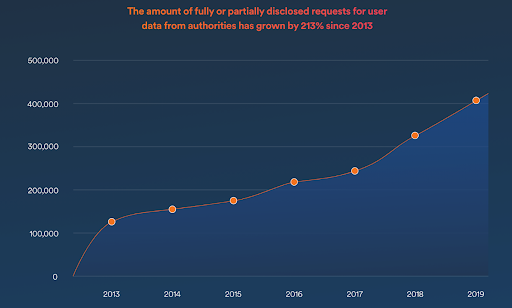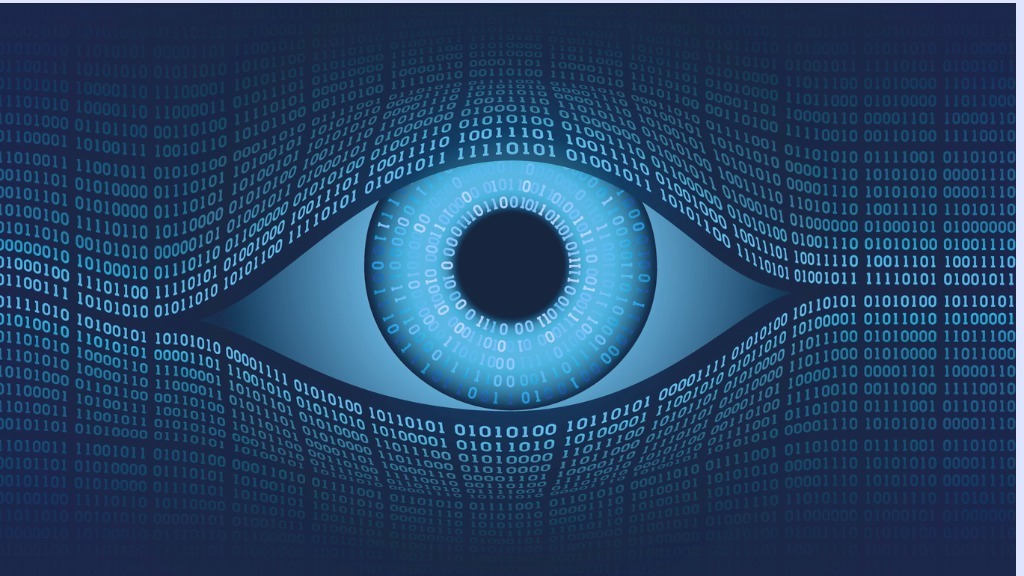It has been known for some time that big tech gathers, analyzes, and sells vast amounts of consumer data. But a new survey by Surfshark highlights the extent of this user data surveillance.
The study was based on an analysis of user data requests received by the likes of Apple, Google, Facebook, and Microsoft from the governments of 66 countries between 2013 and 2020. It summarizes the degree of fully or partially disclosed data requests provided by these companies.
They received a staggering 3,067,228 over that eight-year span. Out of that, almost two million requests were either fully or partially disclosed by the big tech companies. Surfshark research found that the minimum level of disclosure by any company was 55%, with one of them fulfilling more than three quarters of all government requests for data from around the world.

To make matters worse, the volume of requests fulfilled has steadily risen each year since 2012, and climbed sharply since 2017. This is yet another indicator that the surveillance state is not just a reality — the surveillance state is broadening towards becoming the surveillance planet.
EU Countries Among the Most Surveilled
When you view the number of requests per 100,000 people per year by authorities to big tech, Surfshark noted a threefold increase. In addition, the study found that seven out of the top 10 countries with the highest number of user data requests are from the European Union. Singapore, the United States, and Australia complete the list of the most surveilled countries.
“During the past years, the world has witnessed widespread adoption of physical and online surveillance tools,” said Vytautas Kaziukonis, CEO of Surfshark. “An increasing number of governments are deploying a range of surveillance technologies under the promise of maintaining order and public safety. However, it is evident that tracking and monitoring citizens can be far more overreaching and infringe people’s privacy.”
Seven out of the top 10 countries with the highest number of user data requests are from the EU.
A tiny island in the Mediterranean turned out to be the leader of the pack. Malta topped the list of user data surveillance, with 765 requests for user data per 100,000 people. Another tiny country in Asia, Singapore, ranked second at 373. Germany came in third place with 353 requests.
Which countries had the lowest rates? Kenya, the Philippines, and China were at the bottom of the list with less than one request per 100,000 people. However, the believability of official Chinese government data must be questioned. Even if accurate, it is likely that many additional requests are happening at a local level, without the need to send requests directly to the big tech giants.
US Government Surveillance Increases
With the European Union coming out so badly in the survey, those living in the U.S. should not feel too superior. Between 2013 and 2020, big tech received almost 40% more user data requests from U.S. government entities than from all the EU countries combined. In other words, the U.S. appears to be surveilling far more than any other nation.
Big tech received almost 40% more user data requests from U.S. government entities than from all the EU countries combined.
Google is by far the leader in the overall number of disclosed requests and has held that title since 2013. But compared to the others in big tech, it has a relatively low request disclosure average of 58%, in second place behind Apple.
These numbers are staggering. But one needs to ask a simple question: “Do we believe the numbers quoted by these companies? Are there checks and balances? Who regulates and/or monitors the circumstances of these “surveillance” processes? Are they legal at all?
The government’s uses of this data are obvious. That’s scary enough. But what about their uses by commercial entities in our capitalist USA market?
We know it happens. But how does it happen and what the process of doing so are closely guarded secrets. Few know how. But at least we know now it’s done and it’s done every day by everybody — at least everybody that carries a cell phone.
Check this out.
https://youtu.be/usChNgjyJ7g
Summary
Just imagine how long such surveillance has been used for commercial AND government purposes. By the way, there’s absolutely no reason to even try to remain anonymous. In today’s world, if we want to communicate, be entertained, work, and have a private life, the only availability for that is to live in a small village in Fiji where you have access to dancing topless Polynesians every day.
Oh, and bring both mothers-in-law and fathers-in-law for you and your wife.
Wait: I’ll stay in the U.S. and take my chances with “Big Brother!”

